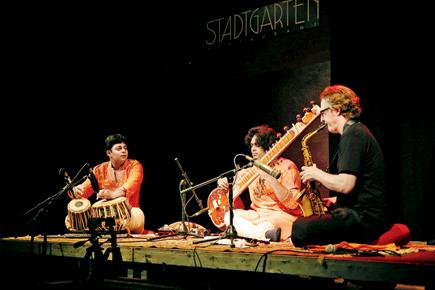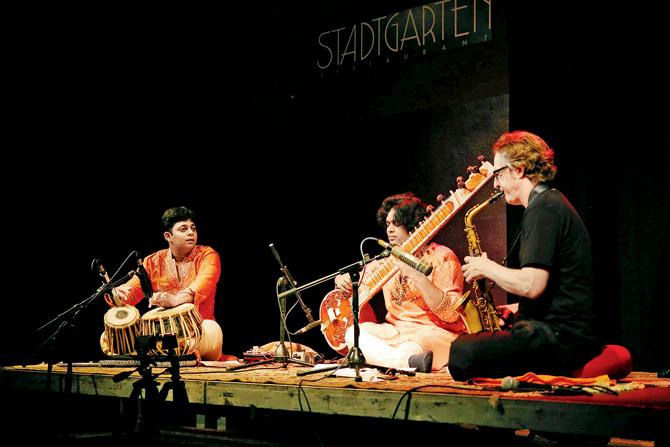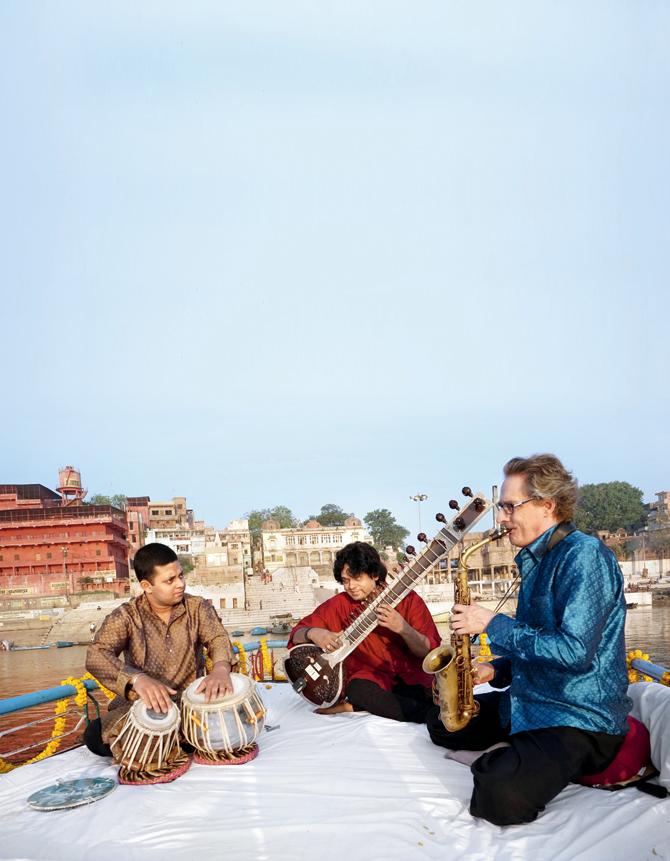Tomorrow, catch a trio showcase a confluence of Hindustani classical music and Jazz at an open-air concert

 The members of Trio Benares (from left) Prashant Mishra, Deobrat Mishra and Roger Hanschel perform at a concert in Germany; (below) at a ghat in Varanasi
The members of Trio Benares (from left) Prashant Mishra, Deobrat Mishra and Roger Hanschel perform at a concert in Germany; (below) at a ghat in Varanasi
ADVERTISEMENT
In October 2014, Stadtgarten, a city park that doubles up as a music venue in Cologne, Germany, came alive with sounds of the sitar, tabla and saxophone, as three artistes took to the stage. While Deobrat Mishra, belonging to the Benares Gharana, played the sitar, his nephew, Prashant Mishra joined in with the tabla. Completing the troika was German saxophonist Roger Hanschel. The concert led to the birth of Trio Benares, a group that presents a confluence of Hindustani classical music with Jazz. Tomorrow, they debut in Mumbai with an open-air concert organised by Goethe Institut/Max Mueller Bhavan Mumbai.
The world has witnessed collaborations between Indian classical music and Jazz for many decades. “It might have started in the ’60s with Pandit Ravi Shankar opening himself up to Western musicians. In the ’70s, for example, Ali Akbar Khan played with the American saxophonist John Handy. John McLaughlin also works a lot with Indian musicians. Later in the ’80s, Charlie Mariano played a lot with the Karnataka College of Percussion,” recalls 52-year-old Roger, who discovered his love for Indian classical music in the early ’80s, when he heard Ustad Bismillah Khan play the shehnai.
“However, I was dissatisfied with the little knowledge of the music IâÂu00c2u0080Âu00c2u0088had. So, I decided to spend time in Varanasi, where Bismillah Khan lived, to get in touch with the music directly,” he says. Here, he met the Mishras for the first time in 2013 and ended up forming Trio Benares.

He elaborates on the challenges of fusing the two traditions, “Gauging the rhythmical complexity of Indian classical music remains a challenge for me. For them, it is a challenge to follow my compositions. The idea is not just to add Indian classical music to Jazz but transfer aspects of the other tradition into your own without losing your identity.”
At the concert, the group will present compositions from their award-winning album, Assi Ghat, named after a famous ghat in Varanasi that stands at the confluence of Ganga and Asi rivers.
The album comprises seven compositions, including the traditional Bhairavi raag and a composition by Roger titled, Charlie’s Reverberations. “Roger and I have written the songs,” says 40-year-old Deobrat, adding, “In the concert, we will also add some traditional songs from Benares. All instruments are played without any electronic additions.”
Meanwhile, 26-year-old Prashant, who started learning the tabla at the age of five, uses it to add rhythms to the compositions. When we ask about the advice he receives from his uncle, he shares, “From him, I learnt how to communicate together in music.”
Giving us a glimpse into their jamming process, Deobrat shares, “We don’t look at it like we’re coming from different styles. We think more about where to go together musically. Since we all come from a different music traditions, our musical notations vary, of course. So, we learn new songs by ear and play together until we have reached an understanding.” The group has begun writing new songs for their second album to be recorded next year.
On: Friday 20, 7 pm,
At: Amphitheatre, Bandra Fort.
RSVP: www.eventbrite.com
 Subscribe today by clicking the link and stay updated with the latest news!" Click here!
Subscribe today by clicking the link and stay updated with the latest news!" Click here!






